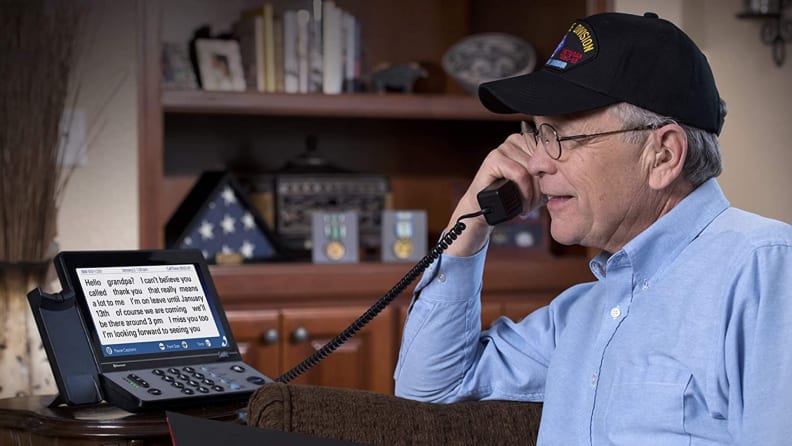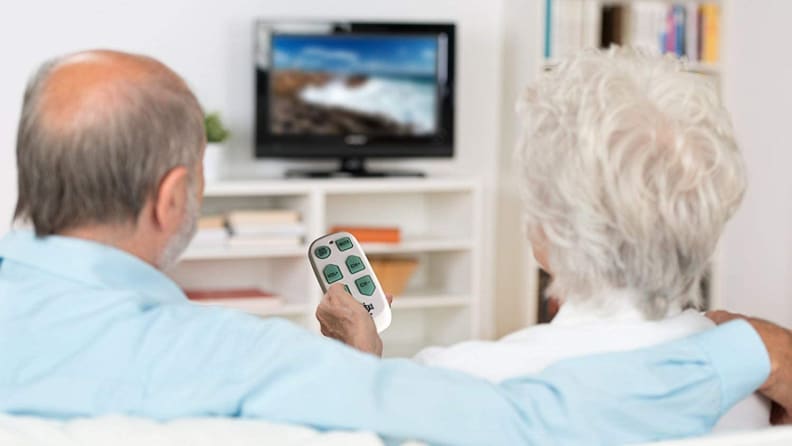If you’ve got age-related hearing or vision loss, these things can help
Assistance comes in many packages
Products are chosen independently by our editors. Purchases made through our links may earn us a commission.
When you age, hearing and vision loss are par for the course. In your 40s and 50s, these impairments are likely just beginning and little more than a nuisance (or fodder for a good joke). But, as Boomers choose to age in place in record numbers, physical limitations and visual and hearing impairments can make that choice incredibly difficult.
As these types of impairments progress, they can begin to affect your quality of life and your independence. Fortunately, there are plenty of products on the market that make it easier to navigate day-to-day life.
In true 21st century style, technology is often there to answer the call. Available tech for visual impairment and hearing loss can range from relatively simple to downright complex. At the end of the day, it’s up to you to choose what you’re comfortable with.
If you’re beginning to experience low vision or hearing loss, here are a few ways to assist your tired eyes and ears.
About age-related hearing loss
According to the National Institute on Deafness and Other Communication Disorders, about one-third of adults between the ages of 65 and 70 will experience some degree of hearing loss. Moreover, by age 75, nearly half of all seniors will find themselves dealing with impaired hearing.
Kerry Burnight, Ph.D., and founder of The Gerontologist Inc., explains a little bit about the science behind age-related hearing loss.
She says, “As we get older, degeneration within the inner ear and along the nerve pathways to the brain can impact our hearing. Most of the time, these changes are related to the health of tiny hair cells in the inner ear that help us hear. These hair cells take the sound waves our ears collect and translate them into electrical signals for the brain to interpret as recognizable sounds. Since hair cells do not regenerate or regrow, the hearing loss we experience as a result of this damage is permanent.”
This loss of hearing can affect seniors because it limits their ability to interact with the world. Dr. Burnight explains, “Hearing impairments tend to put a good deal of limitations on many activities, often resulting in isolation, dependence, and frustration.”
While there isn’t much that you can do to entirely prevent hearing loss, Dr. Burnight notes that prolonged exposure to excessive noise is by far the biggest risk factor for hearing loss, so it’s best to minimize your exposure as much as possible.
Products to help those with hearing loss

A captioned telephone makes it easier to chat.
For those experiencing hearing loss, amplifiers for phones and TVs are almost a must-have.
Sony makes noise-canceling headphones that can work wonders to lower the level of ambient noise around you, making it far easier to hear phone calls, TV’s, music, or even audiobooks. They deliver crisp sound quality and effective noise cancellation. A built-in mic enables you to take hands-free calls, and the unit can last for up to 30 hours on one charge. And, they’re on our list of Best Noise-Canceling Headphones we’ve ever tested.
Phones are essential for managing your day-to-day life and keeping in contact with family members, but hearing loss can make phone calls incredibly difficult.
The Hamilton Captioned Telephone keeps you effortlessly connected.
With easy-to-read print on the screen, users can read what’s being said. What’s more, this telephone features large buttons, an easy-to-read backlit display for people with low vision, and the volume is adjustable up to 40dB, which is loud enough for those with moderate hearing loss.
Popular audio manufacturer Bose has the solution for people who find watching TV and movies problematic because of hearing loss. Adding a Bose soundbar offers better sound quality, plus it clarifies speech and enhances vocals and pronunciation. It’s small enough to be wall-mounted, pairs easily via Bluetooth, and comes with a remote control. For a more budget buy, we also love the top-rated, easy to use Vizio V21-H8 soundbar.
About age-related vision loss
Award-winning optometrist, professor, and lecturer Dr. Dorothy Hitchmoth says that “age-related macular degeneration, diabetes, and glaucoma are leading causes of vision loss in seniors in the United States.”
Dr. Hitchmoth shares that for seniors who want to age in place and remain independent, taking care of your vision is one of the most important ways to ensure this happens.
“Vision loss can interfere with one’s ability to perform almost all activities of daily living,” she says, “so taking steps to protect your eyes should be a priority.”
Products to help those with visual impairment

This universal remote keeps things simple.
For those with low vision, the overarching theme is magnification—beyond a pair of readers. The good news is there are options that are low-tech (or no-tech) and, of course, plenty of tech-rich options as well.
“There are many applications available on iPads or tablets, cell phones, and computers,” Dr. Hitchmoth shares. “The key thing to remember is that there is no one-size-fits-all approach. Glasses, magnifiers, and technological solutions may be used in combination for moderate vision loss.”
When reading or surfing the internet, tablets provide exceptional functionality. Screens can be adjusted to a larger font, bolded, and brightened if necessary. Additionally, most tablets have a pinch and zoom feature to help enlarge pictures and the like.
But for instances where paper is still in play, such as a preference for reading books in print, paying bills, looking at photos, and or other factors of daily life, there are a wealth of products that can help you.
If you’re dealing with low vision, Daylight24’s magnifier LED illuminated floor lamp is infinitely helpful perched near your favorite chair. It features 3X magnification and built-in LED light, a gooseneck, and a handle for easy adjustments.
If your favorite book isn’t available on Audible yet, have no fear, the pocket-sized C-pen reader reads text out loud. To use it, just pass the nib across the lines of text and the pen starts talking. Even better, the full functionality of this pen is self-contained; no wires, no wi-fi, and no computer needed.
Continuus makes a universal big-button TV remote control that features six large, back-lit buttons for an easy assist when clicking through channels.
Retirees often cook or bake in their free time, but recipes and ingredient lists are hard for most people to read. Visual impairment can make this task virtually impossible.
A mobile phone screen magnifier is a no-tech way to enlarge your screen. Just flip the magnifier open and prop your phone up behind it. While this magnifier is pretty versatile, it’s perfect for the kitchen because there are no electrical components to get wet or damaged.
A decline in visual acuity and hearing loss is simply a part of the aging process. But with new advancements in tech, hearing or vision impairments do not have to detract from your quality of life when aging in place.
There are plenty of great products and devices on the market to help navigate daily activities with relative ease, and just as you would expect, there’s always something new under development.


